Related Research Articles
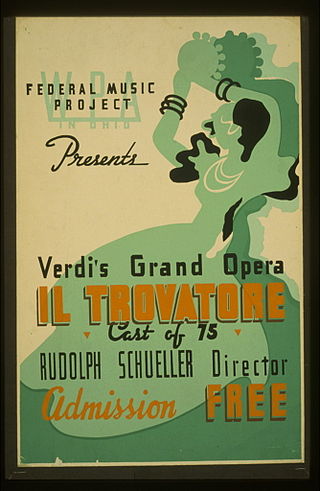
This is a list of notable events in music that took place in the year 1937.
This is a list of notable events in music that took place in the year 1918.
This is a list of notable events in music that took place in the year 1912.

Lew Brown was a lyricist for popular songs in the United States. During World War I and the Roaring Twenties, he wrote lyrics for several of the top Tin Pan Alley composers, especially Albert Von Tilzer. Brown was one third of a successful songwriting and music publishing team with Buddy DeSylva and Ray Henderson from 1925 until 1931. Brown also wrote or co-wrote many Broadway shows and Hollywood films. Among his most-popular songs are "Button Up Your Overcoat", "Don't Sit Under the Apple Tree", "Life Is Just a Bowl of Cherries", "That Old Feeling", and "The Birth of the Blues".
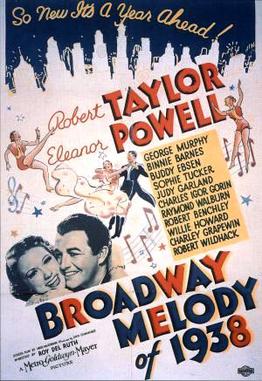
Broadway Melody of 1938 is a 1937 American musical film produced by Metro-Goldwyn-Mayer and directed by Roy Del Ruth. The film is essentially a backstage musical revue, featuring high-budget sets and cinematography in the MGM musical tradition. The film stars Eleanor Powell and Robert Taylor and features Buddy Ebsen, George Murphy, Judy Garland, Sophie Tucker, Raymond Walburn, Robert Benchley and Binnie Barnes.

Babes on Broadway is a 1941 American musical film starring Mickey Rooney and Judy Garland and directed by Busby Berkeley, with Vincente Minnelli directing Garland's big solo numbers. The film, which features Fay Bainter and Virginia Weidler, was the third in the "Backyard Musical" series about kids who put on their own show, following Babes in Arms (1939) and Strike Up the Band (1940). Songs in the film include "Babes on Broadway" by Burton Lane (music) and E.Y. "Yip" Harburg (lyrics), and "How About You?" by Lane with lyrics by Ralph Freed, the brother of producer Arthur Freed. The movie ends with a minstrel show performed by the main cast in blackface.

Lew Fields was an American actor, comedian, vaudeville star, theatre manager, and producer. He was part of a comedy duo with Joe Weber. He also produced shows on his own and starred in comedy films.
Harry Akst was an American songwriter, who started out his career as a pianist in vaudeville accompanying singers such as Nora Bayes, Frank Fay and Al Jolson.

Very Good Eddie is a musical with a book by Guy Bolton and Philip Bartholomae, music by Jerome Kern, and lyrics by Schuyler Greene, with additional lyrics by Elsie Janis, Herbert Reynolds, Harry B. Smith, John E. Hazzard, Ring Lardner and Jerome Kern, and additional music by Henry Kailimai. The story was based on the farce Over Night by Bartholomae. The farcical plot concerns three couples and a sex-crazed voice teacher who board a Hudson River Day Line boat in Poughkeepsie, New York. Chaos ensues when two of the couples cross paths and accidentally trade partners. The vaudeville-style adventure continues at a hotel, where guests pop in and out of rooms while an inebriated desk clerk tries to sort through the madness.
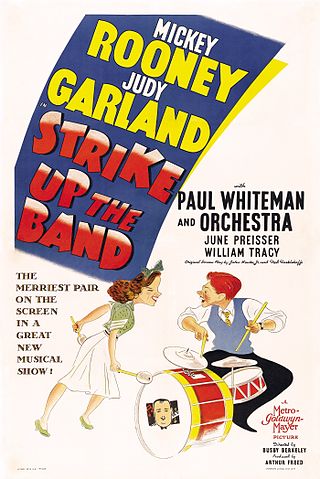
Strike Up the Band is a 1940 American musical film produced by the Arthur Freed unit at Metro-Goldwyn-Mayer. The film was directed by Busby Berkeley and stars Mickey Rooney and Judy Garland, in the second of a series of musicals they co-starred in, after Babes in Arms, all directed by Berkeley. The story written for the 1927 stage musical Strike Up the Band, and its successful 1930 Broadway revision, bear no resemblance to this film, aside from the title song.
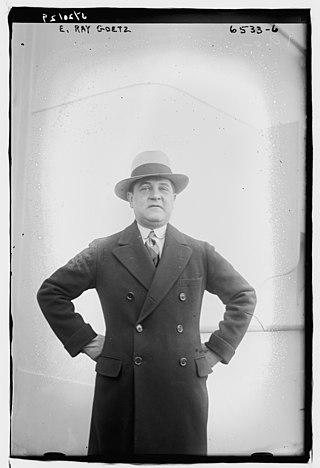
Edward Ray Goetz was an American composer, lyricist, playwright, theatre director, and theatrical producer. A Tin Pan Alley songwriter, he published more than 500 songs during his career, many of them originally written for the New York stage. His songs were recorded by several artists, including Judy Garland, Al Jolson, and Blossom Seeley. He was active as both a lyricist and composer for Broadway musicals from 1906 through to 1930, collaborating with artists like George Gershwin, Cole Porter, Sigmund Romberg, and A. Baldwin Sloane to create material for the theatre.
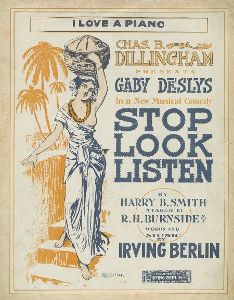
Stop! Look! Listen! is a musical in three acts with music and lyrics by Irving Berlin and book by Harry B. Smith. The piece had additional music by Henry Kailimai and Jack Alau and additional lyrics by G. H. Stover and Sylvester Kalama.

Make It Snappy was a musical revue that ran for 96 performances at the Winter Garden Theatre in the 1922–23 Broadway season. It ran from 13 April to 1 July 1922. It starred Eddie Cantor, who introduced the hit songs "Yes! We Have No Bananas" and "The Sheik of Araby".
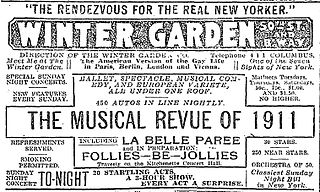
La Belle Paree was a musical revue that launched the legitimate theatre career of Al Jolson. The book was by Edgar Smith, music by Jerome Kern and Frank Tours and lyrics by Edward Madden. Billee Taylor provided additional music and lyrics, and M. E. Rourke and Frederick Day provided additional lyrics. It premiered on Broadway in 1911. The musical is set in Paris, France.

Americana is a musical revue in two parts, with book and lyrics by J. P. McEvoy, and music by Con Conrad with additional numbers by George Gershwin, Ira Gershwin, Philip Charig, James Hanley, B. G. DeSylva, Morrie Ryskind, Arthur Schwartz, Theo Goodwin, Joe Young, and Sam Lewis. The show was presented by Richard Herndon at the Belmont Theatre, and, after many postponements, opened July 26, 1926. The show was staged by Allan Dinehart with dance numbers by Larry Ceballos. The production was designed by John Held, Jr. It ran for 224 performances, closing in February 1927. The cast headlined Lew Brice, Roy Atwell, Betty Compton, Charles Butterworth and the Eddie Elkins Orchestra. The New York Times review called it a "witty, ingenious and sophisticated evening of fun-making, it made up in its abundant humor for more than it lacked in some other departments." The other departments referred to were lack of chorus girls and opulent settings.
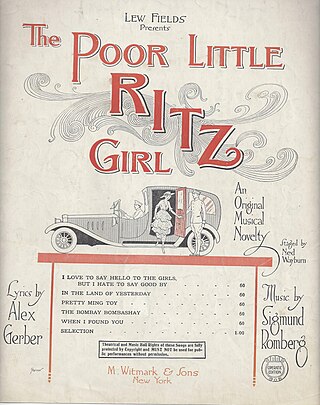
Poor Little Ritz Girl is a musical comedy in two acts, with book by George Campbell and Lew Fields. The show had some songs with lyrics by Alex Gerber and music by Sigmund Romberg and other songs with lyrics by Lorenz Hart and music by Richard Rodgers. The show was produced by Lew Fields at the Central Theatre. It opened on July 28, 1920.
The Ziegfeld Follies of 1919 was a revue produced by Florenz Ziegfeld Jr. Billed as the thirteenth edition of the Ziegfeld Follies series, it had a tryout at Nixon's Apollo Theatre in Atlantic City, New Jersey, on June 10, 1919 and opened at Broadway's New Amsterdam Theatre on June 16, 1919 and closed on December 6, 1919. It is often considered to be the best and most successful of the Follies series produced by Ziegfeld.

The Follies of 1907 is a 1907 musical revue which was conceived and produced by Florenz Ziegfeld Jr. The first of two dozen theatrical revues that are collectively known as the Ziegfeld Follies, the work featured material written by a variety of individuals, including music by Seymour Furth, E. Ray Goetz, Gus Edwards, Billy Gaston, Jean Schwartz, Silvio Hein, Matt Woodward and Gertrude Hoffman; lyrics by Vincent Bryan, Edgar Selden, Will D. Cobb, Billy Gaston, William Jerome, Matt Woodward, Martin Brown and Paul West; and comic and dramatic sketches by Harry B. Smith used in-between and around the musical numbers; Smith also served as head lyricist. Herbert Gresham staged the production, and Max Hoffman, Sr. served as the musical director.
References
- 1 2 3 Dan Dietz (2021). "All Aboard". The Complete Book of 1910s Broadway Musicals. Rowman & Littlefield Publishers. pp. 219–220. ISBN 9781538150283.
- 1 2 3 "ALL ABOARD' BIG HIT NEW ROOF DELIGHTS; An Exceptionally Fine Summer Show in Attractive Surroundings Atop 44th St. Theatre". The New York Times . June 6, 1913. p. 11.